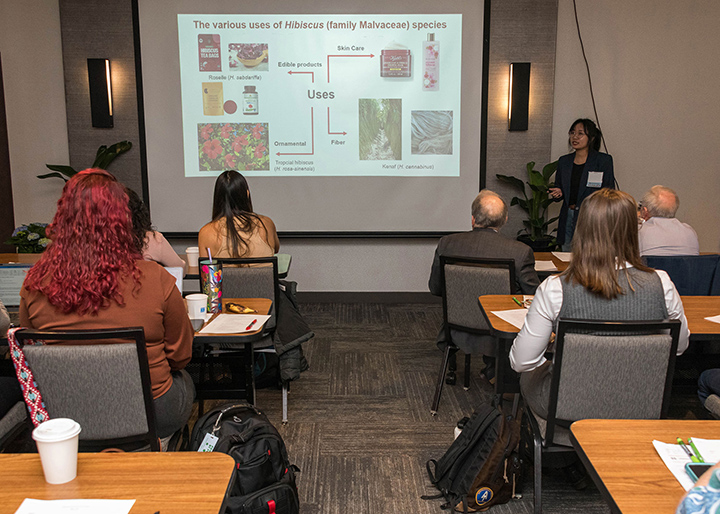MSU hosts national floriculture conference

Mississippi State University Extension Service hosted the 2024 National Floriculture Forum, bringing leaders of the floriculture industry together to discuss key issues, including new research findings, industry updates and new approaches to variety development. PHOTO: Kevin Hudson | MSU Extension Service
Although known for cutting-edge agricultural research and leading the way in world food security efforts, Mississippi State University is no lightweight in researching some of the beautiful things, including colorful flowers and foliage.
Floriculture is the cultivation of flowering plants and ornamentals and is a subset of horticulture, the science of cultivating fruits, vegetables and other plants. While not necessary to stave off world hunger or find a cure for cancer, floriculture is a significant industry, and its support is a priority to MSU.
In late February, MSU hosted the 2024 National Floriculture Forum, an annual conference held at different locations around the country. This year’s event was held in Biloxi. MSU Extension Service horticulturists Jim DelPrince and Christine Coker coordinated the event.
“This year, 39 faculty and graduate students attended the event,” DelPrince said. “Research talks centered on cut flowers, potted ornamental plants, horticulture economics and communications.”
This forum brings leaders of the floriculture industry together to discuss key issues, including new research findings, industry updates and new approaches to variety development.
This year, session speakers included researchers from MSU, the University of Florida, Cornell University, North Carolina State University, Purdue University, Texas A&M University, the University of Minnesota, Michigan State University and others.
Haley Williams, a Mississippi Agricultural and Forestry Experiment Station researcher at the South Mississippi Branch Experiment Station in Poplarville, discussed making floral wine.
“I have been making experimental grape and other fruit wines as part of my research at MSU for three and a half years now,” Williams said. “I see a lot of opportunity for floral wine research, and I can’t wait to try making more.”
Cole Etheredge, an associate professor in the MSU Department of Plant and Soil Sciences, provided the results of his evaluation of the commercial viability of eco-friendly alternatives to traditional floral foam.
Shaun Broderick, MSU Extension horticulturist and MAFES researcher, reported on bedding plant performance in extreme weather events in the Southeast.
“In 2022, 60 trial entries received a score of 4.0 or above,” Broderick said. “That number dropped to 16 under the extreme weather in 2023. Although we found several varieties that still performed well, I’m not sure we are fully prepared for what’s coming.”
Jenny Ryals, MAFES researcher in Poplarville, shared her research on pruning Celosia and its effects on the plant’s later growth and flowering. This project is concentrating on dried flowers.
“Producing the most vibrant color and retaining that color is key for a high-quality dried cut flower,” Ryals said. “Understanding how production and post-harvest practices impact flower color can affect what practices are implemented.
“I hope that these results will help growers make informed decisions on which practices are the best for generating the most vibrant color in their dried cut flower production,” Ryals said.
DelPrince said MSU was honored to host this conference, which was a testament to the work being done at this research institution.
“Communication sessions such as this are important to the floriculture industry nationwide,” DelPrince said. “U.S. faculty and graduate students are conducting important research and projects that will aid consumers, retailers, wholesalers and growers for decades to come.”
Mississippi State University is taking care of what matters. Learn more at www.msstate.edu.
Bonnie A. Coblentz | MSU Extension Service



